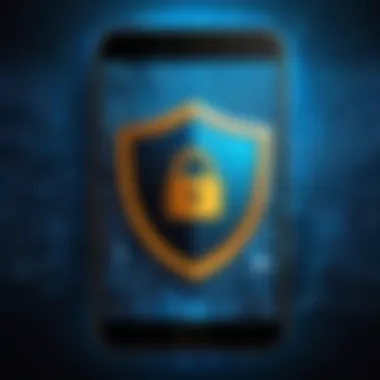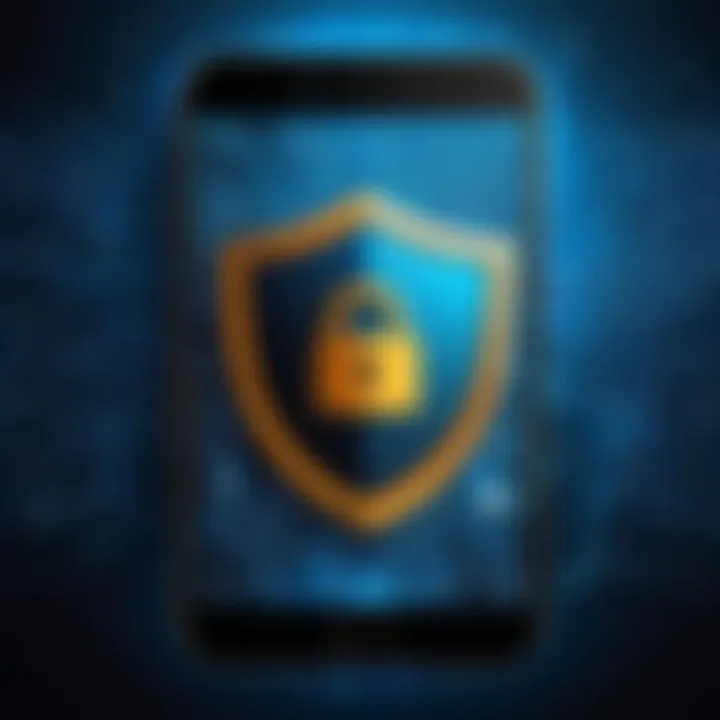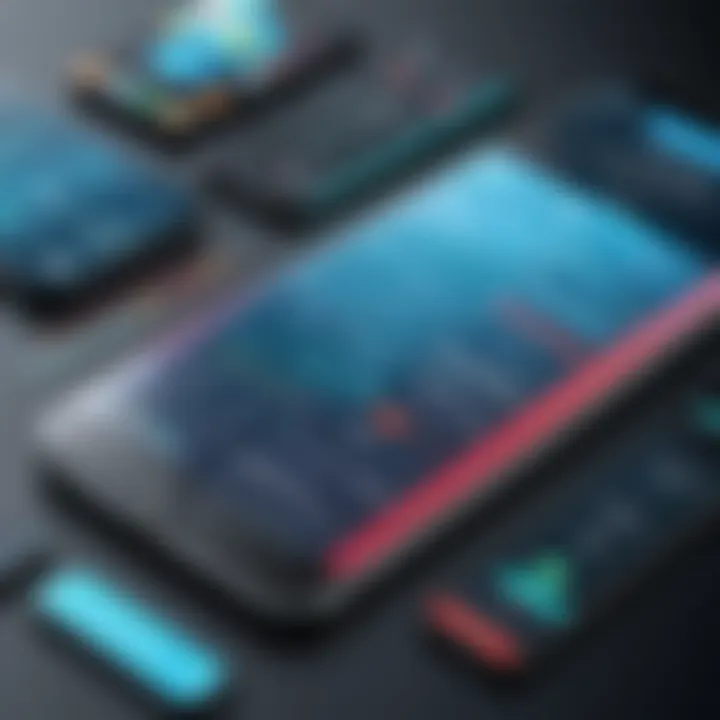Antivirus Solutions for Your iPhone Explained


Intro
The digital age has dramatically altered the landscape of personal and organizational security. In particular, the rise of smartphones has created new vulnerabilities. While iPhones have robust built-in security features, their increasing use invites scrutiny regarding the need for additional antivirus solutions. This is where the examination of antivirus applications for iPhones becomes necessary.
The sophistication of cyber threats today compels a critical discussion on the importance of antivirus software, even on devices like the iPhone that are often perceived as more secure. As we analyze the various risks and potential protections, we aim to offer a clear understanding of why integrating third-party antivirus solutions can be an essential strategy for safeguarding sensitive information and personal data.
Cybersecurity Threats and Trends
Notable cybersecurity threats in the digital landscape
As technology evolves, so do the threats that accompany it. Malware, phishing, and ransomware are just a few of the risks facing iPhone users today. Recent statistics indicate that mobile malware has seen a significant increase in recent years, and iPhones are not immune to these threats. With more than a billion iOS devices in use globally, hackers see an opportunity to exploit vulnerabilities.
Emerging trends in cyber attacks and vulnerabilities
Cyber attacks are becoming increasingly sophisticated. Attackers often employ tactics such as social engineering to trick users into downloading malicious software. The trend towards remote work has also opened new avenues for attacks, as individuals access corporate networks from unsecured devices. Moreover, zero-day vulnerabilities appear regularly and can target users before patches or updates are available.
Impact of cyber threats on individuals and businesses
The consequences of such threats are profound. Individuals may face financial loss, identity theft, or privacy violations. Meanwhile, businesses may suffer reputational damage, legal implications, and operational disruptions. Cybersecurity is no longer just a technology issue; it has significant repercussions for personal and professional spheres.
Best Practices for Cybersecurity
Importance of strong password management
One foundational aspect of security is effective password management. Weak or reused passwords make devices susceptible to unauthorized access. It is essential to use a combination of upper and lower case letters, numbers, and special characters.
Implementing multi-factor authentication for enhanced security
Adding an extra layer of protection can greatly enhance security. Multi-factor authentication (MFA) requires users to provide two or more verification factors. This method significantly reduces the risk of unauthorized access.
Regular software updates and patches for protection
Keeping your iPhone updated is crucial in combating cyber threats. Regular software updates often include patches for security vulnerabilities, closing loopholes that attackers might exploit.
Secure online browsing habits and email practices
Practicing cautious online behavior is essential. Avoid clicking on suspicious links or attachments in emails. Utilize secure browsing habits such as checking for HTTPS in URLs to ensure safe online experiences.
Privacy and Data Protection
Importance of data encryption for privacy
Encryption serves as a vital safeguard in protecting personal information from unauthorized access. Ensuring that data is encrypted can reduce the risk of sensitive data exposure in the event of a breach.
Risks associated with sharing personal information online
Oversharing on social networks presents inherent risks. Attackers can leverage personal information to manipulate users or gain access to accounts, making it vital to cultivate awareness about data sharing practices.
Strategies for safeguarding sensitive data and personal details
Employing strategies such as using secure storage solutions can enhance personal data protection. Always assess the permissions requested by applications and limit access to information that is not necessary for their function.
Security Technologies and Tools
Overview of key cybersecurity tools and software
Several tools exist to bolster security on mobile devices. Antivirus software like Norton, McAfee, and Bitdefender offers comprehensive protection against various digital threats. Firewalls can also filter incoming and outgoing traffic, further enhancing security.
Benefits of using antivirus programs and firewalls
Antivirus applications often provide real-time protection and scanning features, which serve as proactive defenses against malware. Firewalls complement antivirus solutions by creating barriers against unauthorized network access.
Application of Virtual Private Networks (VPNs) for secure data transmission
Using a VPN can assure encrypted connections and safeguard data transmission over public networks. This is especially important for users who frequently access sensitive information on unsecured Wi-Fi connections.
Cybersecurity Awareness and Education


Educating individuals on recognizing phishing attempts
User awareness is paramount in preventing cyber threats. Recognizing phishing emails and malicious websites can help users avoid falling victim to these schemes. Institutions should prioritize training their employees in cybersecurity best practices.
Promoting cybersecurity awareness in the digital age
Raising awareness regarding cybersecurity issues is essential. Individuals must understand the implications of their online actions and the potential risks that accompany them.
Resources for learning about cybersecurity fundamentals
There are numerous resources available for individuals interested in enhancing their knowledge of cybersecurity. Websites such as Wikipedia and Britannica offer extensive information on various topics. Engaging with forums, such as Reddit, can also provide community sharing of experiences and tips.
In the ever-evolving digital landscape, staying informed about cybersecurity measures is not just beneficial—it's essential for protecting personal and professional data.
Understanding Mobile Security
Mobile security is a critical aspect of modern digital life. With the increasing reliance on smartphones for personal and professional activities, understanding mobile security becomes essential for users. This section aims to uncover the nuances that define mobile security, focusing specifically on iPhone devices, which boast a reputation for robust security features but are not immune to threats.
An understanding of mobile security encompasses various factors including potential threats, user behaviors, and the inherent capabilities of the devices themselves. The benefits of a well-rounded approach to mobile security include protecting sensitive information, preventing unauthorized access, and mitigating risks associated with malware and phishing attacks. As more users move towards mobile banking, online shopping, and sensitive communication through apps, the need for vigilance increases.
The Rise of Mobile Threats
The landscape of cyber threats has evolved significantly with increased smartphone utilization. Mobile threats have risen sharply, driven by the availability of user data and the lucrative nature of targeting personal devices. Malware, phishing attempts, and data breaches are no longer exclusive to desktop computers.
Recent data indicates a steep increase in mobile malware, particularly designed to exploit platform vulnerabilities. Cybercriminals leverage social engineering tactics to deceive users into downloading malicious applications or clicking on phishing links. This environment fosters a necessity for mobile users to understand the gravity of mobile threats.
Why iPhones Are Targets
Although iPhones are generally perceived as secure, they are not beyond scrutiny from cyber attackers. The reasons iPhones become targets include their popularity and the wealth of personal data stored within them. As one of the leading smartphone brands, any successful attack could yield significant financial and personal information.
Additionally, while iOS offers built-in security features, such as a closed ecosystem and stringent app store reviews, these measures do not guarantee complete protection. Users often underestimate their role in maintaining security. As a result, habits like reusing passwords and neglecting updates make their devices susceptible.
In summary, understanding mobile security is paramount for iPhone users. Recognizing the evolving threat landscape is the first step in avoiding potential security breaches and ensuring the integrity of personal information.
Built-in Security Features
The built-in security features of iPhones are crucial in safeguarding users against various cyber threats. Apple has designed iOS with an emphasis on security, incorporating several key elements that enhance the overall protection of its devices. Understanding these features can help users appreciate the foundational level of security provided by their devices, as well as recognize the limitations that may still necessitate antivirus software.
iOS Security Architecture
Apple's iOS security architecture is a layered approach that aims to protect the personal data and privacy of its users. At the core of this architecture is the Secure Enclave, a dedicated subsystem that handles sensitive tasks such as encryption and biometric data processing. Every iPhone contains this hardware-based security feature, ensuring that sensitive information remains protected, even if the operating system itself is compromised.
In addition to the Secure Enclave, iOS employs sandboxing techniques for its applications. This means that each app operates in its own isolated environment, restricting its access to data and resources outside its designated space. This greatly reduces the likelihood of malicious apps accessing sensitive information.
Moreover, Apple enforces a strict app review process through the App Store. Apps are vetted for compliance with standards that prioritize user privacy, although this does not guarantee that malicious software cannot occasionally slip through.
Regular Updates and Patches
One of the primary advantages of using an iPhone is the regular updates and patches provided by Apple. These updates typically cover security vulnerabilities and are released frequently to address emerging threats. Users receive notifications for these updates, and it is essential to install them promptly to maintain the integrity of device security.
The process of updating iOS is designed to be straightforward. Users can enable automatic updates to ensure that their devices remain current without requiring manual intervention. This feature is vital because cyber threats evolve rapidly, and timely updates can protect against newly discovered vulnerabilities.
The Role of Antivirus Software
Antivirus software plays a significant role in enhancing the security of iPhones, bridging the gap left by built-in features. Given the increasing sophistication of threats targeting mobile devices, it is crucial to understand how antivirus solutions can add another layer of protection. These applications not only safeguard against malware but also provide additional features that help users maintain the integrity of their personal data.
Among the advantages of employing antivirus software for iPhones is the ability to detect and neutralize potential threats before they can damage the device or compromise sensitive information. This monitoring can be essential, especially for individuals who frequently download apps or engage in online transactions. Antiviruses typically include tools for phishing protection, web browsing safeguards, and app scanning, which can significantly enhance the overall security posture.
However, there are considerations to keep in mind. Some users may question the necessity of antivirus software given Apple's robust iOS security ecosystem. While it is true that iOS is designed to be secure, it is not infallible. Thus, users must consider their personal usage patterns and the potential risks involved. For example, individuals who visit less-reputable websites or download various applications may find that dedicated antivirus software is essential.
Do You Need Antivirus for iPhone?
The decision on whether to install antivirus software on an iPhone varies from user to user. Factors influencing this decision include how the iPhone is used and the network conditions. For everyday users who mainly browse trusted websites and download reputable applications, the built-in security features may suffice. However, for those who engage in risky behavior, such as accessing unsecured networks or installing lesser-known apps, the necessity for additional protection becomes evident.
Recent statistics indicated that cyber threats targeting mobile devices have been on the rise. This includes malware designed to exploit vulnerabilities in mobile operating systems. Thus, for users who prioritize comprehensive protection, investing in antivirus software can provide peace of mind.
How Antivirus Software Works
To appreciate the value of antivirus software, it is essential to understand how it operates. Typically, these applications utilize a combination of signature recognition and heuristic analysis to detect threats. Signature recognition involves identifying known threats based on a database of malware signatures. This method is effective for combating established threats, but it may not catch new or modified malware.


In contrast, heuristic analysis aims to identify suspicious behavior by examining how apps operate. For example, if an application attempts to gain permissions it does not require, the antivirus may flag it for further examination. This dual approach allows antivirus software to adapt to the ever-evolving threat landscape.
Additionally, many antivirus programs offer real-time protection, scanning files and apps as they are downloaded or executed. This proactive method is vital in preventing malware from infiltrating the device. Moreover, features such as VPNs and secure browsing tools are increasingly common in antivirus offerings, providing users with a range of security tools in one package.
"The landscape of mobile security is changing, making antivirus software a relevant consideration for iPhone users today."
In summary, while the necessity for antivirus software can be situational, understanding its functionality allows users to make informed decisions about their mobile security. Having the right tools helps improve overall safety, particularly in a world where cyber threats continue to grow in number and complexity.
Evaluating Antivirus Options for iPhone
In an era where mobile threats are increasingly prevalent, understanding how to evaluate antivirus options for iPhones becomes essential. Given the vast array of choices available, it is vital for users to discern which solutions align best with their specific needs. Factors such as effectiveness, user interface, price, and customer support are significant considerations when navigating this complex landscape. Proper evaluation not only contributes to enhanced device security but also ensures that users invest in solutions that are worth their time and money.
Top Antivirus Applications
Overview of Popular Choices
In the marketplace, several antivirus applications have emerged as popular choices among iPhone users. Among them are Bitdefender Mobile Security, Norton Mobile Security, and Intego Mobile Security. Each of these solutions has established a reputation for reliability and performance. Their widespread adoption can be attributed to factors like effective malware detection rates and user-friendly interfaces.
Key characteristics of these apps typically include robust scanning capabilities and real-time protection against various threats. For example, Bitdefender offers a unique feature called the VPN service, which adds an extra layer of privacy while browsing. However, some users may find that the comprehensive features can slow down device performance.
Unique Features and Offerings
When examining the more unique features of antivirus software, it's evident that certain applications stand out. Norton Mobile Security includes a new feature called Wi-Fi Security Alerts, which notifies users if their current connection is unsafe. This remains a beneficial offering that enhances overall security while browsing.
Moreover, Bitdefender also offers anti-theft features that allow users to locate and lock their device if stolen. However, it is important to remain cautious as not all unique features may be necessary for every user, possibly resulting in unwanted subscription costs.
Compatibility with iOS
Another critical aspect to consider is compatibility with iOS. It is vital that any chosen antivirus solution works seamlessly with the specific version of the operating system in use. Applications such as Norton and Bitdefender ensure that they remain updated with the latest iOS versions, providing users with compatibility assurances.
The main benefit of high compatibility is that it reduces the likelihood of glitches or security holes appearing due to integration issues. For instance, Intego specializes solely in Apple products, ensuring deep compatibility. However, users with older devices may experience limitations with some applications, which is an important consideration during the evaluation process.
User Reviews and Ratings
When assessing the effectiveness of antivirus options, it is beneficial to consider user reviews and ratings. These perspectives provide insights into real-world performance and any potential drawbacks not initially visible in marketing materials. Platforms such as Reddit or Facebook groups can serve as valuable resources to glean opinions from fellow iPhone users, enriching the decision-making process surrounding antivirus solutions.
Costs and Subscription Models
Understanding the costs and subscription models for antivirus software is crucial for iPhone users. This section aims to analyze not just the pricing but also the underlying value each model offers. Optimal security often comes at a price, but many users might not know whether to opt for free solutions or invest in paid services. It is essential to consider effectiveness, features, and the overall benefits of a solution, particularly in a landscape where cyber threats are evolving rapidly.
Free vs. Paid Solutions
When discussing antivirus options for iPhones, users frequently encounter both free and paid solutions. Free antivirus applications, such as Avast Security, generally provide basic protection. However, their features might be limited compared to their paid counterparts. For example:
- Basic virus scanning and detection.
- Limited real-time protection.
- Fewer updates and slower response time to threats.
On the other hand, paid antivirus solutions, such as Norton Mobile Security and Bitdefender Mobile Security, typically offer a more comprehensive approach:
- Advanced malware detection and proactive threat management.
- Continuous updates, ensuring the latest protections are in place.
- Features such as VPN service, secure browsing, and protection against phishing attempts.
While free options may suffice for some users, they often lack the depth required for serious cybersecurity. Thus, anyone frequently using their iPhone for sensitive transactions, like online banking or shopping, may find it worthwhile to invest in a paid antivirus solution.
Long-term Value Assessment
Evaluating long-term value is vital when selecting an antivirus for an iPhone. This assessment is not solely about the upfront cost, but also about the benefits that come over time. A few factors to ponder include:
- Cost of Data Breaches: The financial implications of a potential data breach can far outweigh the annual cost of a premium antivirus.
- Peace of Mind: Investing in robust security can provide assurance that your personal information and data are better protected.
- Support and Updates: Paid solutions usually offer better customer support and regular updates, which are crucial in addressing emerging threats.
"Investing in quality cybersecurity tools can prevent larger losses caused by future breaches."
Common Misconceptions
Understanding common misconceptions about antivirus software on iPhones is crucial for users aiming to secure their devices effectively. Many people hold beliefs that can lead to inadequate protection or poor security practices. This section addresses those misconceptions, clarifying the realities and helping you make informed decisions regarding your cybersecurity.
Antivirus Guarantees Complete Protection
A common myth is that installing antivirus software guarantees complete protection for your iPhone. While antivirus solutions enhance security, they are not a panacea. No software can provide absolute security due to the constantly evolving threat landscape. Attackers adopt new tactics frequently, which means that even the best antivirus app could miss specific threats.
It's important to recognize that antivirus software serves as an additional layer of protection rather than a comprehensive solution. This software can help in scanning for malicious apps, keeping unwanted software at bay, and blocking potential phishing attempts. However, it should not replace fundamental security practices like updating your device regularly or being cautious about the apps you install.


In addition, antivirus tools may not detect every vulnerability. Users should be aware that threats can also arise from legitimate software, making it vital to evaluate applications carefully. Therefore, instead of relying solely on antivirus for protection, combining its use with good cyber hygiene will yield better results.
Antivirus software is a crucial tool, but it does not guarantee complete protection against all threats.
iPhones Are Invulnerable
Another prevalent misconception is that iPhones are immune to all security threats. While iOS has robust security measures, it does not mean iPhones are infallible. This belief can lead to complacency among users. Cybercriminals are constantly developing new techniques to bypass security measures, making any device potentially vulnerable.
In reality, hackers can exploit weaknesses in apps or operating systems. Phishing attacks and malware can still hit iPhone users. Security breaches have occurred in the past, underscoring the importance of having a proactive security strategy rather than resting on the laurels of an "invulnerable" device.
Iphones also face physical risks. Loss or theft of a device can lead to unauthorized access to personal data. Users must employ features such as Find My iPhone, two-factor authentication, and secure backups to mitigate these risks. Overall, considering an iPhone as invulnerable can leave users open to serious cybersecurity issues.
By dispelling these myths, users can develop a more realistic understanding of mobile security. A well-rounded approach that blends security software with user vigilance can significantly enhance protection against threats.
Best Practices for iPhone Users
In the realm of cybersecurity, best practices serve as the foundational layer of protection for iPhone users. While built-in security features in iOS provide a measure of safety, they alone cannot guarantee complete security against threats. Employing best practices can significantly reduce risks and enhance the overall security posture of your device. It is paramount that users actively manage their security habits to combat continually evolving threats. This section outlines two critical areas: maintaining cyber hygiene and recognizing phishing attempts.
Maintaining Cyber Hygiene
Cyber hygiene refers to the set of practices that users can adopt to keep their devices secure and reduce vulnerabilities. It is not merely about installing antivirus software but involves a holistic approach to security. Here are essential components to consider:
- Regular Software Updates: Always keep your iOS updated. Updates often contain security patches that address newly discovered vulnerabilities.
- Use Strong Passwords: Create complex passwords for your accounts. Consider using a password manager to store and generate passwords securely.
- Enable Two-Factor Authentication (2FA): This adds an essential layer of security by requiring a second form of verification before accessing your accounts.
- App Source Verification: Only download applications from the App Store. Avoid third-party app stores, as they may host malicious software.
- Network Security: Avoid using public Wi-Fi networks for sensitive transactions. If necessary, use a Virtual Private Network (VPN) to encrypt your Internet connection.
Maintaining good cyber hygiene is a proactive measure that requires ongoing commitment. Consistently applying these practices can help in thwarting potential threats before they become a significant issue.
Recognizing Phishing Attempts
Phishing is a method used by cyber criminals to deceive users into providing sensitive information. This can occur through emails, text messages, or websites that appear legitimate. Awareness is key to recognizing and avoiding these attempts. Consider the following tactics to identify phishing:
- Check the Sender's Address: Examine the sender's details carefully. Often, phishing emails come from addresses that may look similar but are not quite right.
- Look for Generic Greetings: Phishing messages often use generic phrases like "Dear Customer" instead of addressing you by name. This can be a red flag.
- Examine Links Before Clicking: Hover over any links in messages to see the actual URL. Ensure it points to the legitimate website before clicking.
- Urgency and Threats: Be cautious of messages creating a sense of urgency. Phrases like "Your account will be suspended if you do not act now" are classic indicators of phishing.
- Verify with the Source: If you receive a suspicious message claiming to be from a trusted source, contact them directly using verified contact information rather than using links provided in the message.
Recognizing phishing attempts is an invaluable skill in today’s digital environment. Educating oneself about the nuances of such schemes contributes significantly to maintaining a safe digital life.
"Being proactive in adopting best practices not only enhances your iPhone's security but also fosters a habit of vigilance that can prevent security breaches."
Future of Mobile Antivirus Solutions
The landscape of mobile security is transitioning rapidly. As smartphones become the primary devices for communication, finance, and entertainment, the demand for robust security solutions will only increase. The future of mobile antivirus solutions is shaped by various factors including user behavior, technological advancements, and the evolving nature of cyber threats.
Trends in Mobile Security
With every technological advancement, there emerge new trends that redefine user expectations and security protocols. Key trends in mobile security include:
- Cloud-Based Security Solutions: More antivirus solutions are shifting towards cloud computing. This allows for real-time updates and reduces the load on device resources.
- AI and Machine Learning: Advanced algorithms assist in identifying threats quicker and more accurately. AI technologies analyze patterns to predict potential vulnerabilities, enhancing proactive measures.
- Privacy Concerns: As users become more aware about data privacy, antivirus developers emphasize features that secure user data and limit tracking.
- User-Centric Designs: Simplicity in design and user experience is gaining importance. Solutions that are easier to use and understand are preferred, especially by non-technical users.
These trends indicate that future mobile antivirus solutions will prioritize efficiency, user-friendliness, and privacy protection, keeping pace with user demands.
Evolving Threats and Solutions
The threats are evolving just as rapidly as the technologies designed to combat them. It is important to understand the changing dynamics of cyber threats. Major aspects of this evolution include:
- Ransomware: Increasingly, mobile users are being targeted by ransomware schemes. This leads to a demand for antivirus solutions that provide backup and encryption features.
- Phishing Attacks: As phishing methods become sophisticated, a layered approach to security is essential. Solutions must now include scanning URLs in real-time and educating users about potential risks.
- IoT Integration: With the rise of smart devices, securing mobile devices becomes linked to the security of home networks. Comprehensive antivirus solutions will need to address this interconnectedness.
- Regular Updates: Continuous updates and quick response times to newly identified threats are necessary for maintaining security. Users expect their antivirus software to adapt, often in real-time.
"The effectiveness of an antivirus solution isn't solely measured by its ability to scan for known threats, but also by its responses to emerging threats and the preventative measures it affords its users."
Understanding these evolving threats is crucial for both users and developers. The future of antivirus solutions will hinge on their agility and responsiveness to address these ever-changing challenges.
The End
In the context of mobile cybersecurity, concluding this analysis on antivirus for iPhone highlights critical considerations every user must reflect upon. While iPhones are generally perceived as secure due to Apple's rigorous security architecture, they are not impervious to threats. Thus, understanding the role of antivirus software becomes essential. Selecting suitable software may enhance device safety, especially as new threats emerge.
Summarizing Key Points
- Mobile Threat Landscape: The evolution of malware and phishing attempts signifies a need for robust security measures, as vulnerabilities can be exploited regardless of a device's reputation.
- Antivirus Software: Both free and paid solutions offer various features. Their efficacy can depend on factors like update frequency and compatibility with iOS.
- User Reviews: Feedback from existing users can provide valuable insights into the practical performance of antivirus applications, helping potential users make informed choices.
- Best Practices: Maintaining good cyber hygiene is equally important. Users should remain vigilant and recognize potential threats, alongside using antivirus solutions.
- Future Trends: Staying updated on emerging trends in mobile security can help users better understand the tools necessary for protecting their devices.
Final Recommendations
For iPhone users, my recommendations are as follows:
- Evaluate Needs: Consider personal usage patterns. If the user frequently interacts with unknown links or downloads files, antivirus software might be a worthwhile investment.
- Research Options: Look into well-reviewed antivirus applications. Pay attention to their unique features, customer support services, and overall user experience.
- Balance Cost and Benefits: Assess whether the features provided by paid solutions justify the investment, keeping long-term security in perspective.
- Implement Best Practices: Engage in proactive behaviors, like updating apps regularly and avoiding suspicious links, alongside using antivirus software.
"Understanding the nuances of mobile security is key to safeguarding not just devices but also personal information and data."
In summary, while Apple offers solid built-in protections, the landscape of mobile threats necessitates a more proactive approach. By utilizing antivirus solutions and adhering to best practices, iPhone users can significantly reduce the risk of falling victim to cyber threats.







